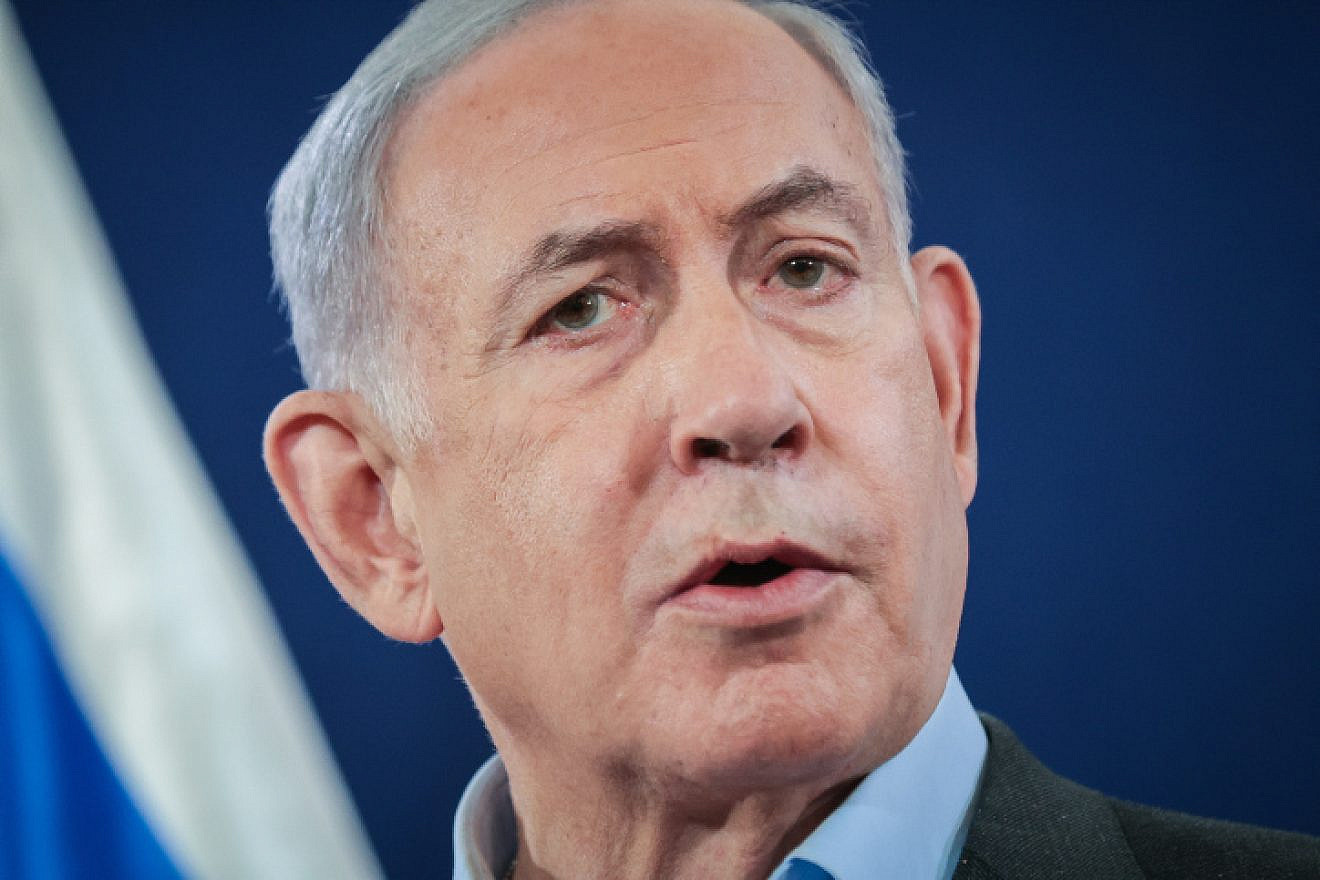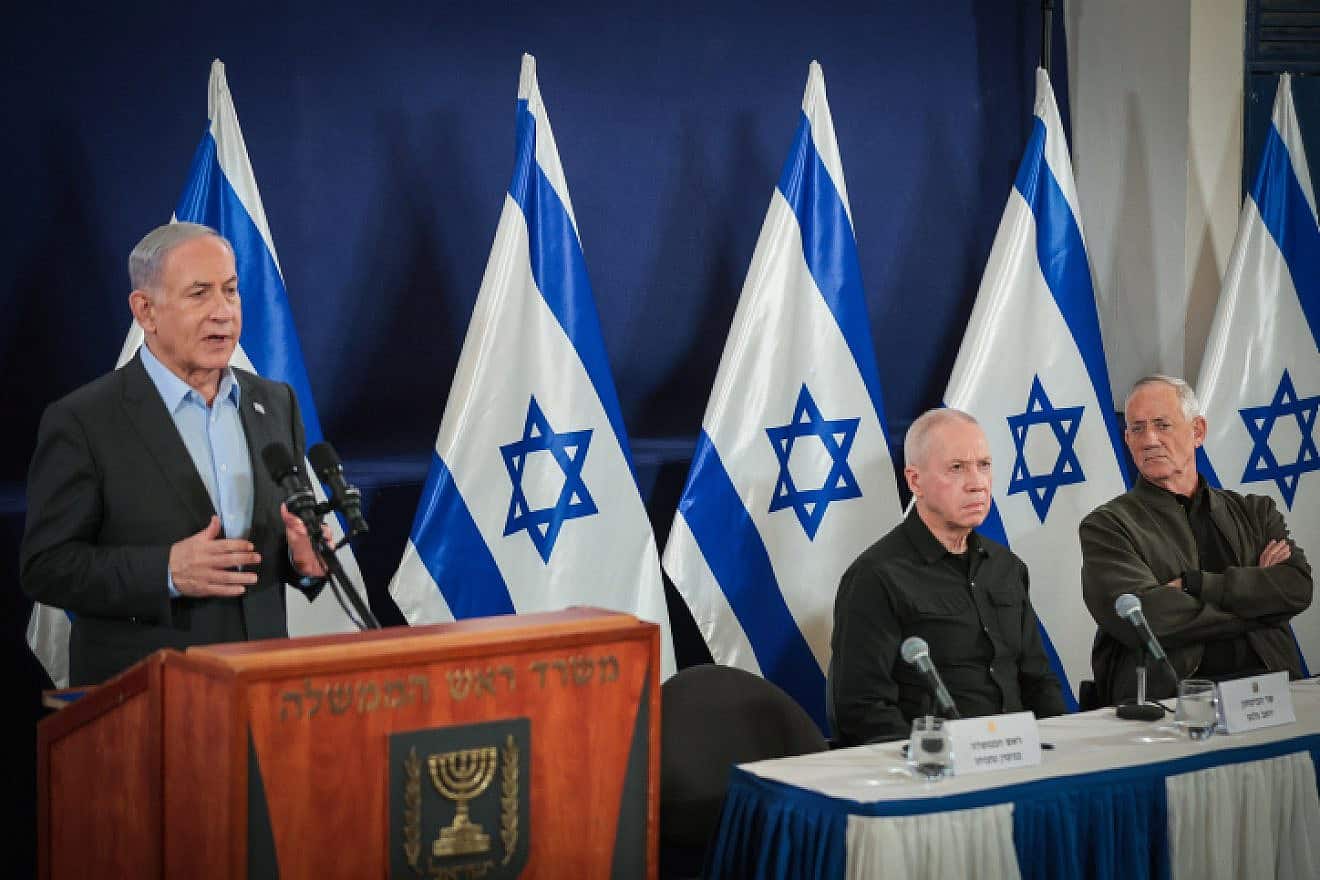Prime Minister Benjamin Netanyahu emphasized his determined opposition to the Palestinian Authority taking over the Gaza Strip in a post-Hamas world, speaking during a nationally televised press conference at IDF headquarters in Tel Aviv on Saturday night.
The idea, favored by the Biden administration, which sees a P.A.-ruled Gaza Strip as a necessary first step towards a two-state solution, has become a point of contention between Israel and the U.S. even as the war to cleanse the coastal enclave of its Hamas terrorist overlords continues, a war that according to Israeli estimates is expected to take many months to finish.
Netanyahu said that while he “greatly” appreciates U.S. support for Israel, the two countries will have to agree to disagree on such a role for the P.A.
“There will not be any element that educates for terrorism, finances terrorism and dispatches terrorism” in the Gaza Strip, Netanyahu said.
“I also made this determination clear to U.S. National Security Advisor Jake Sullivan with whom I met on Thursday,” the prime minister said. “This is not ‘politics,’ but policy. This is my policy.”
“I will not allow us to replace Hamastan with Fatahstan, that we replace Khan Yunis with Jenin,” he continued. “I will not allow the State of Israel to repeat the fateful mistake of Oslo, which brought to the heart of our country and to Gaza, the most extreme elements in the Arab world, which are committed to the destruction of the State of Israel and who educate their children to this end.”
The P.A. has a well-documented policy of ‘pay-for-slay,’ rewarding terrorists monetarily for carrying out attacks against Jews. (It announced it would pay nearly $3 million to the families of Hamas terrorists slain on Oct. 7.)
Members of the P.A.’s ruling party, Fatah, headed by P.A. President Mahmoud Abbas, have refused to condemn the massacre. Indeed, Fatah’s terrorist wing, the Al-Aqsa Martyrs Brigades, boasted that it took part in the attack, distributing images of Gazan terrorists on Oct. 7 wearing Fatah’s yellow headband.
The White House, in a nod to the terroristic nature of the P.A., which currently controls parts of Judea and Samaria, has referred to the need for a “revitalized” P.A., presumably one stripped of its destructive elements, though it has remained vague on the details.
“The debate between Hamas and Fatah is not ‘whether’ to eliminate the State of Israel but ‘how’ to do it,” Netanyahu said. “According to a poll that was carried out a few days ago, 82% of the Palestinian population in Judea and Samaria justifies the horrific massacre of Oct. 7.
“As of this moment, the Palestinian Authority senior leadership simply refuses to condemn the massacre and some of them even praise it openly. They will control Gaza on ‘the day after?’ Haven’t we learned anything? As the prime minister of Israel, I will not allow that to happen,” Netanyahu said.
The prime minister said it was important that Israel make its position clear to its allies even before the war was finished so as not to “foster illusions.”
“I reiterate to our friends: After the elimination of Hamas, the Gaza Strip will be demilitarized, will be under Israeli security control, and no element in it will either threaten us or educate its children to destroy us,” he said.

Joining Netanyahu at the press conference were Defense Minister Yoav Gallant and Minister-without-Portfolio Benny Gantz of the opposition National Unity Party, a member of the War Cabinet.
For now, Israel has presented a united front regarding its opposition to P.A. control over the Gaza Strip. Last week, Gantz said that he wouldn’t support the P.A. taking over the Gaza Strip, at least at present, and opposition leader Yair Lapid of the Yesh Atid Party expressed his opposition, tweeting Wednesday, “No one on earth thinks that Gaza should be handed over to Abu Mazen [P.A. leader Mahmoud Abbas] the day after the war. Not even one!”
President Isaac Herzog joined in rejecting a P.A. solution, telling the Associated Press, “What I want to urge is against just saying ‘two-state solution’. Why? Because there is an emotional chapter here that must be dealt with. My nation is bereaving. My nation is in trauma.”
In response to a reporter’s question, Gallant also backed Netanyahu’s position, describing how, during his time in the IDF, he witnessed the vast amount of weapons that flowed into Judea and Samaria once the P.A. took over.
Also discussed at the press conference was the unfortunate killing by IDF soldiers of three Israeli hostages who’d managed to break free from the clutches of their Hamas captors. They were killed in a case of mistaken identity.
“Since the tragedy yesterday, one thought has followed me: ‘What would have happened if something had been different?’ I am certain that we all share this thought. We were so close to embracing them now. But I regret that we cannot turn back the clock,” Netanyahu said
“Everyone who has fought on the battlefield knows that the distance between victory and disaster is a hair’s breadth. Out of the immense pain, we will learn and implement the lessons, and we will not relent in the military and diplomatic effort to safely return home all of our hostages.”


























